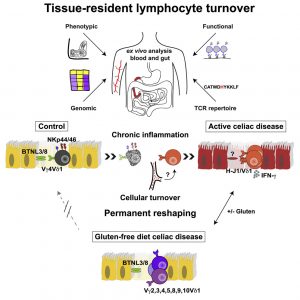
Mayassi, T., Ladell, K., Gudjonson, H., et al. Chronic Inflammation Permanently Reshapes Tissue-Resident Immunity in Celiac Disease. Cell. 2019; Graphical Abstract. doi:10.1016/j.cell.2018.12.039.
Results from a new study suggest that cell immunity in the bowel is irreversibly altered by celiac disease.
T cells, a type of white blood cell, are critical to the immune system. T cells found in the bowel are normally protective “tissue-healing” cells. However, in those with celiac disease, T cells produce inflammation when exposed to gluten. This inflammation causes damage to the lining of the bowel and produces the acute symptoms that patients experience when they ingest gluten.
Dr. Bana Jabri, study author from the University of Chicago, explained: “Chronic inflammation caused by gluten causes an immunological scar that results in the loss of intestinal resident immune (gamma delta T cell) subset that has an important role in tumor surveillance and fighting against infection.” This means that the damage caused by gluten results in the permanent loss of these beneficial immune cells in celiac patients.
While a strict, gluten-free diet can alleviate many of the short-term symptoms of celiac disease, the diet alone is not enough to undo the permanent damage to the intestine.
Dr. Jabri noted, “This immune subset is partially preserved in children, suggesting that early intervention may rescue this cell subset.” Early diagnosis and treatment of celiac disease may be able to save some of these beneficial cells and prevent additional permanent damage to the bowel.
Stay informed. Click here to get updates on the latest developments in research news, advocacy, events, and more from the Celiac Disease Foundation.
Chronic Inflammation Permanently Alters Immune Cells in Celiac Patients
